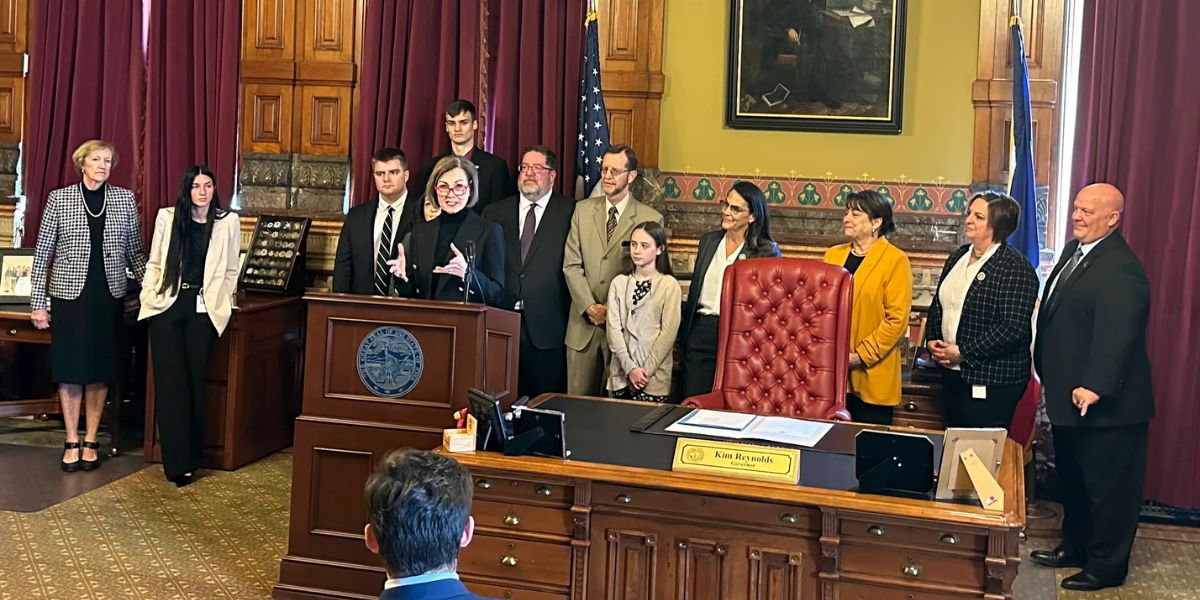A Step Backward? Iowa’s Repeal of Gender Balance Law Sparks Debate
Megan Alter, despite a strong desire to run for government and evident qualifications, questioned her role in the 2019 Iowa City City Council election. Alter, who is now a city councilor, began her political career on the Iowa City Housing and Community Development Commission, which she credits with paving the way to higher office.
Alter opted to run for city council because of her experience on the commission and the skills she gained managing policies concerning the city’s provision of housing, jobs, and services to low and moderate-income individuals. However, Alter stated that she needed to be convinced that she was qualified to run for municipal council.
“I have seen it time and time again, about women needing to feel qualified and way overqualified in comparison to some other people,” Alter went on to say. “It does take more nudging for women, and I had a lot of really, really supportive people who said, ‘You would be really good at this, go for it.'” But there was a lot of, ‘What am I doing?’.
Iowa Gov. Kim Reynolds signed Senate File 2096 into law in April, repealing the need for Iowa’s boards and commissions to have an equal representation of men and women. Alter is one of hundreds of women who have become ubiquitous in Iowa politics and government since the state was one of the first to implement legislation requiring a gender balance on state and local boards and commissions in 1987.
Experts fear that recent advances will be squandered and that a new law would result in fewer women serving in state and local governments.
Alter, a senior manager at ACT, attended a presentation by 50-50 in 2020, a bipartisan group of Iowa women aiming to have half of the seats in the state senate occupied by women by 2020. Alter said the group’s message inspired her to run for city council.
Alter lost her first try for an at-large seat on the Iowa City City Council in 2019 to Janice Weiner and Laura Bergus. Alter ran and won again two years later, and she has been a member of the city council since 2021.
Women hold authority at the highest levels of state government, from Reynolds becoming the first female governor in 2017 to Rita Hart taking leading the Iowa Democratic Party in 2023. Republicans argue that the mandate is no longer essential because women now occupy the majority of state leadership positions, while Democrats argue that the statute is critical to ensuring women have a seat at the table.
After the gender balance rule was expanded to local boards in 2009, gender balance on city and county boards and commissions increased dramatically. According to data from Iowa State University’s Carrie Chapman Catt Center for Women in Politics, the proportion of women serving in cities increased from 13% to 61%, while in Iowa counties it increased from 12% to 62%.
Prior to the repeal, Iowa was one of nine states that had laws requiring or encouraging gender balance on state and municipal boards and commissions. Many of these statutes are being challenged in the courts.
Research shows that a legislator’s gender affects their policy objectives. According to the research, when more women are elected to government, legislation that reflects the objectives of families, women, and ethnic and racial minorities, as well as an emphasis on quality of life, becomes more prominent.
Iowa Court Declares the Law Unconstitutional
Iowa lawmakers repealed the law in response to a January verdict that indicated the State Judicial Nominating Commission’s requirement for gender balance was unconstitutional.
The Pacific Legal Foundation, based in California, filed a lawsuit on behalf of former state senator Charles Hurley challenging the gender balance requirement on the panel that recommends justices to the governor for Iowa’s appellate courts. The organization maintained that requiring gender balance was illegal and violated the equal protection guarantee of the 14th Amendment to the United States Constitution.
On Jan. 11, U.S. District Judge Stephanie Rose, the top judge for the Southern District of Iowa, delivered her order against the state, halting the law’s enforcement.
“This is not to say that gender discrimination does not exist — it plainly does across the spectrum of jobs in this country — but the evidence presented to the court does not establish this fact in this commission, in this state, in this time,” Rose said in her ruling.
The Pacific Legal Foundation, a nationwide firm that focuses on government overreach, has filed similar challenges in Arkansas, Tennessee, Alabama, and Louisiana.
Hurley and his counsel were present when Reynolds signed the repeal into law on April 3. The business continues to work to repeal gender-balance rules across the United States. Terese Grant, co-president of the Iowa League of Women Voters, said the elimination of the gender balance mandate was not surprising given the judgment that the statute was unconstitutional.
“Once I heard that, I thought gender balance was going to be gone,” Grant went on to say. “It was just very, very, very disappointing that [the repeal] also happened in Iowa.”
Women Lead Iowa Politics
Proponents of the repeal believe that it is no longer required because women already hold leadership positions in Iowa politics.
Iowa is led by a female governor and attorney general, and both houses have women in leadership, with House Democrats led exclusively by women.
In 2017, Reynolds became Iowa’s first female governor, succeeding outgoing Governor Terry Branstad. Reynolds won the midterm elections the following year, becoming Iowa’s first female governor.
The repeal is part of Reynolds’ larger plan to reform Iowa’s board and commission system, which she outlined as a legislative priority in her January Condition of the State Address. Iowa lawmakers recently approved legislation that would remove 67 of the state’s 256 boards and commissions. Reynolds has not yet given final assent to the bill.
“I believe that our focus should always be on appointing the most qualified people,” Reynolds stated in a news release dated April 3. “This includes active citizens who genuinely want to serve their state or local community, as well as individuals with relevant experience. This strategy ensures that boards and commissions at all levels of government are effective and serve Iowans well. That is precisely what this measure seeks to accomplish.
When asked for a reply, The Daily Iowan was directed to Reynolds’ previous statements.
Sen. Annette Sweeney, R-Buckeye, voted against extending the gender balance rule to local boards and commissions in 2009 and again in February to repeal the legislation.
“I look at it as empowering women because we are not getting a position on the board and commission just because of our gender,” Sweeney told the crowd. “We are going to get the position for a particular board because of our merits.”
Sweeney stated that the repeal will have no impact on women’s participation in politics because there are no gender-balance criteria in politics or running for office, and women are becoming more interested in the political arena.
According to data from the Center for American Women and Politics, Iowa ranks 39th out of 50 states in terms of women holding office in a local government body by 2024. In Iowa, 28.9 percent of local officeholders are female.
According to the center, women will make up only 29.3 percent of the Iowa Legislature in 2024, ranking the state 35th in the nation for the percentage of women holding a seat in state legislatures.
Iowa became the second-to-last state in the country to elect a woman to Congress after U.S. Sen. Joni Ernst, R-Iowa, was elected in 2014.
Since then, the number of women representing Iowa in the federal delegation has increased. Currently, half of Iowa’s four members of Congress are women.
Democrats Say Repeal Comes Too Soon
Some Democrats argue that repealing the law will impede women’s political growth.
Jennifer Konfrst, D-Windsor Heights, is the first woman to lead the House Democratic caucus, having been elected in 2021. House Democrats now have a completely female leadership team.
Konfrst started her government career on a commission. In the early 2000s, Konfrst was a member of a county consolidation commission entrusted with evaluating whether to merge Polk County and Des Moines governments. She stated that the commission provided her with an opportunity to gain experience in government work.
“Women really get their feet wet in the government process on those boards and commissions,” she said. “Now, I think women are ready to run for office right now and don’t need that experience, but it serves oftentimes for women to help get more comfortable with the process.”
According to Konfrst, women deserve to be heard, particularly on Iowa’s boards and commissions. Republicans also mentioned the problems some boards and commissions have in achieving gender balance. State law permits officials to fill a seat after making a good-faith effort to achieve gender balance for three months.
“Women’s voices deserve to have equal access and an equal place at the table as men’s when it comes to the work that these important boards and commissions do,” said Konfrst. “So, I’m not sure why in 2024 we’re just throwing up our hands and saying, ‘I give up.'” It appears to me that we should merely work harder to achieve balance.”
State Sen. Sarah Trone Garriott, D-Windsor Heights, stated that there was not a single woman among Iowa Senate Democrats who believed the gender-balance rule was no longer necessary and that politics still had a “boys club mentality.”
“The women in my chamber told stories about women they knew and served with a long time ago who fought for those changes,” Trone Garriott stated in an interview with the DI. “It felt very much like hard-won changes that people worked very hard on to make sure it happened, and it was kind of like losing their legacy, which was emotionally discouraging for a lot of women in our caucus.”
Sen. Herman Quirmbach, D-Ames, voted to repeal the state statute. During a Feb. 20 floor debate on the bill, he stated that the criteria is no longer necessary because women are the most competent for the positions and that eliminating it will allow women-majority boards and commissions.
Experts: Repeal Could Lead to Fewer Women in Government
Since the state’s gender-balance rule was passed, the Carrie Chapman Catt Center for Women and Politics at Iowa State University has been tracking compliance in counties and several of the state’s bigger towns.
In 2022, the center’s Gender Balance Project collected data from nine local boards and commissions, stating that gender balance was attained in 12 Iowa cities across all boards and commissions evaluated.
According to the survey, women accounted for 42.96 percent of all reported city board and commission members, as well as 32.38 percent of all reported chair positions.
Center Director Karen Kedrowski, an ISU associate professor of political science, stated that Iowa’s gender-balance rule was unusual in the nation when it was initially enacted.
According to Kedrowski, the law successfully boosted the percentage of women serving on municipal boards and commissions, putting Iowa ahead of other states; nevertheless, repealing the statute will result in a gradual drop in the number of women serving in such posts.
“We are falling behind the rest of the nation, not because women are getting elected, but because they’re not,” he remarked. “The numbers of women are not increasing as quickly as they are in other states.”
According to the Iowa Department of Human Rights, women account for more than half of Iowa’s population and outnumber men in 90 of the state’s 99 counties. However, the department stated that women have historically been underrepresented on municipal boards and commissions.
The agency admitted that unless some effort is made, Iowa’s councils, boards, and commissions may struggle to find women to serve.
“Women are just more reluctant and discount their own qualifications and their own achievements compared to men on average, and that contributes to the reason why you don’t see a lot of women stepping forward to run for office,” he added. “I would wager that it’s harder to recruit women for certain boards and commissions for the same reason.”
Alter, a member of the Iowa City City Council, believes local electors must work harder to guarantee that boards and commissions have representatives with diverse perspectives and experiences, including gender, background, ethnicity, and other qualities.
“I wish we were there culturally, socially, and within our own communities where we didn’t have to worry about making sure that there was a balance,” Alter remarked in an interview. “We’re not in a ‘post’ anything world, and to say that we are, that we don’t need that anymore, is dangerous.”










